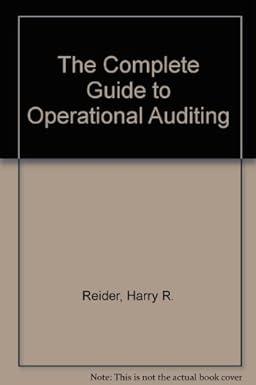Question
Flexible Budget, Multiple Regression The controller for Muir Company's Salem plant is analyzing overhead in order to determine appropriate drivers for use in flexible budgeting.
Flexible Budget, Multiple Regression
The controller for Muir Company's Salem plant is analyzing overhead in order to determine appropriate drivers for use in flexible budgeting. She decided to concentrate on the past 12 months since that time period was one in which there was little important change in technology, product lines, and so on. Data on overhead costs, number of machine hours, number of setups, and number of purchase orders are in the following table.
| Month | Overhead Costs | Machine Hours | Number of Setups | Number of Purchase Orders |
| January | $ 32,296 | 1,000 | 20 | 216 |
| February | 31,550 | 930 | 18 | 250 |
| March | 36,280 | 1,100 | 21 | 300 |
| April | 36,867 | 1,050 | 23 | 270 |
| May | 36,790 | 1,170 | 22 | 285 |
| June | 37,800 | 1,200 | 25 | 240 |
| July | 40,024 | 1,235 | 27 | 237 |
| August | 39,256 | 1,190 | 24 | 303 |
| September | 33,800 | 1,070 | 20 | 255 |
| October | 33,779 | 1,210 | 22 | 195 |
| November | 37,225 | 1,207 | 23 | 270 |
| December | 27,500 | 1,084 | 15 | 150 |
| Totals | $423,167 | 13,446 | 260 | 2,971 |
Required:
1. Run a multiple regression equation using machine hours, number of setups, and number of purchase orders as independent variables. Prepare a flexible budget for overhead for the 12 months using the results of this regression equation. (Round the regression coefficients to the nearest cent and predicted overhead to the nearest dollar.)
If there is no variance, enter "0" for the amount and select "NA" in the last column. Enter all your answers as positive amounts.
| Muir Company Flexible Budget for Overhead | ||||
| Month | Predicted Overhead | Actual Overhead | Variance | |
| January | $ | $ | $ | Favorable |
| February | Favorable | |||
| March | Unfavorable | |||
| April | Unfavorable | |||
| May | Favorable | |||
| June | Favorable | |||
| July | Unfavorable | |||
| August | Unfavorable | |||
| September | Favorable | |||
| October | Favorable | |||
| November | Favorable | |||
| December | Unfavorable | |||
| Totals | $ | $ | $ | Favorable |
Feedback
2. Now, suppose that the controller remembers that the factory throws two big parties each year, one for the 4th of July and the other for Christmas. Rerun the multiple regression with machine hours, number of setups, and number of purchase orders, and add a dummy variable called Party. (This variable takes the value one for months with a factory-sponsored party, and zero otherwise.) Prepare a flexible budget for the 12 months using the results of this regression. (Round the regression coefficients to the nearest cent and each predicted overhead amount to the nearest dollar.)
If there is no variance, enter "0" for the amount and select "NA" in the last column. Enter all your answers as positive amounts.
| Muir Company Flexible Budget for Overhead | ||||
| Month | Predicted Overhead | Actual Overhead | Variance | |
| January | $ | $ | $ | Unfavorable |
| February | Favorable | |||
| March | Favorable | |||
| April | Unfavorable | |||
| May | Favorable | |||
| June | Unfavorable | |||
| July | Favorable | |||
| August | Unfavorable | |||
| September | Favorable | |||
| October | Favorable | |||
| November | Favorable | |||
| December | Unfavorable | |||
| Total | $ | $ | $ | Unfavorable |
Step by Step Solution
There are 3 Steps involved in it
Step: 1

Get Instant Access to Expert-Tailored Solutions
See step-by-step solutions with expert insights and AI powered tools for academic success
Step: 2

Step: 3

Ace Your Homework with AI
Get the answers you need in no time with our AI-driven, step-by-step assistance
Get Started


